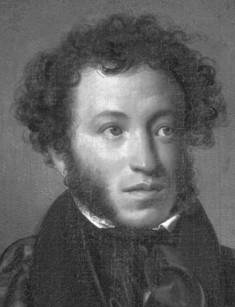
Alexander Pushkin: biography
Alexander Sergeyevich Pushkin was born on June 10, 1799, in Moscow. His father Sergei Lvovich Pushkin was a retired major and a hereditary nobleman. His mother Nadezhda Osipovna was a great-granddaughter of Abram Gannibal, the famous "black servant of Peter the Great." Pushkin inherited his hot temper and love of life from his mother and her African roots. His talent for poetry allowed him to masterfully express his thoughts on paper, infecting his contemporaries and descendants with his feelings.
In addition to Alexander, there were two other children in the family: Lev and Olga. Alexander's parents were very educated people, even by the standards of their time, when the whole society was characterized by the knowledge of Latin and French, foreign and domestic history, literature. In the house, there were always famous creative personalities: artists, poets, musicians.
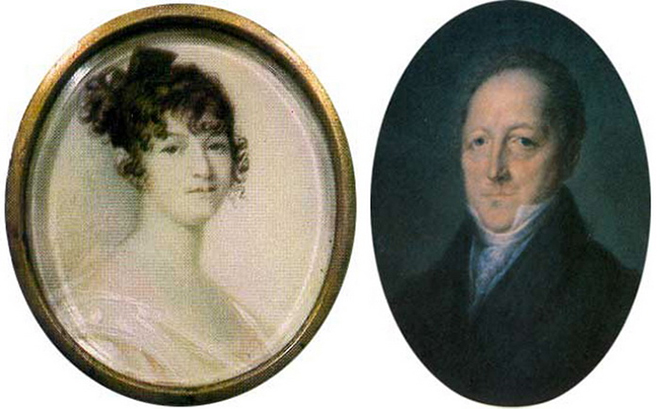
Alexander Sergeyevich's home education was excellent. But it is not French language that gave to the world such an outstanding poet, whom we all know and love with his quivering attitude to the history of Russia, folk tales, legends and Russian people. His grandmother is responsible for the fact that Pushkin loved everything about Russia. He spent a lot of time in the village. Maria Alekseyevna spoke and wrote only in Russian. She hired the nanny Arina Rodionovna.
Thanks to her tales, stories, her melodious speech and sincere love, the little boy was accustomed to the sound of folk speech, its natural beauty, and poetry. Subsequently, this allowed to balance the typically "French" upbringing and education, which was characteristic of entire noble Russia. Even his first poem, young Pushkin wrote in French.
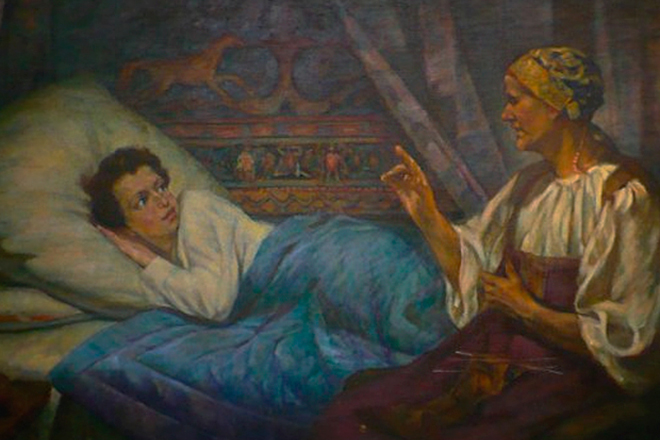
However, the reason for this was not only the love for a foreign language but also the exotic nationality of the African great-great-grandfather. It is the origin and heredity that largely influenced the formation of the hot temper and the bright appearance of the poet.
In childhood, Alexander not only learned the language and other sciences but also listened to Arina Rodionovna's fairy tales. The boy read a lot of books. He took books from his father's library as well as books from the library of the Buturlin family and his uncle Vasily Lvovich.
Lyceum in Tsarskoye Selo
For the first time, twelve-year-old Pushkin came to Petersburg with his uncle in order to enter the newly opened Tsarskoye Selo Lyceum. The Lyceum was under the patronage of the imperial family and was located in the building near the Catherine Palace. Alexander was one of the first thirty students who studied in the Lyceum.
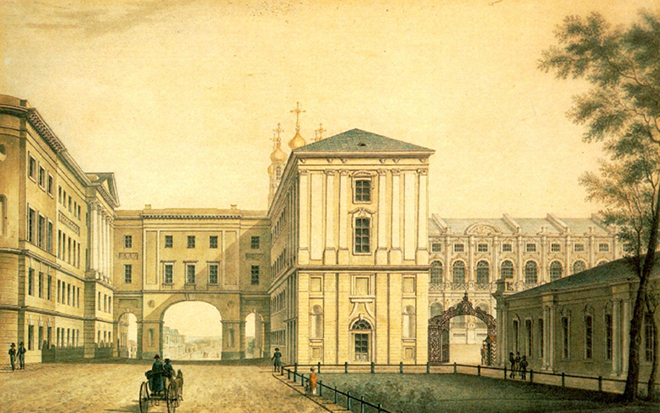
The education in the Lyceum was truly revolutionary. The boys from the best families were taught by enthusiastic teachers. There was a friendly and relaxed atmosphere in the Lyceum. Also, there was no corporal punishment, which was already an innovation.
In the Lyceum, Pushkin quickly became friends with the other students. His classmates were Delvig, Küchelbecker, and Pushchin. They were friends all his life and saved the most pleasant memories of the Lyceum years.
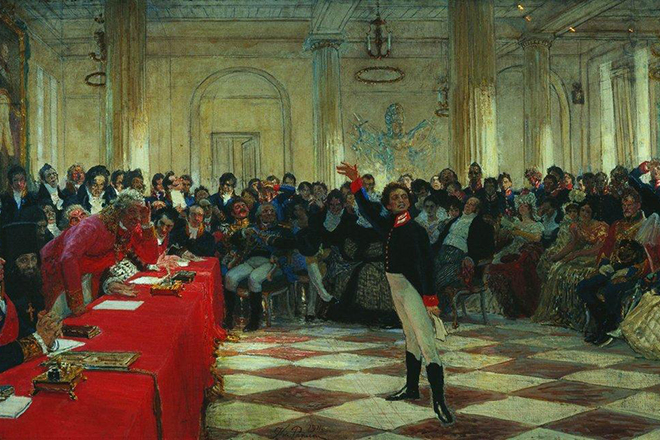
The first students of the Lyceum were very successful. They listened to lectures of famous professors. The members of the Academy of Sciences and teachers of the Pedagogical Institute examined the students.
The students devoted a lot of time to creativity, publishing hand-written journals. The boys organized a circle of poets and novelists. Its members gathered in the evenings and wrote poems. Subsequently, three of Pushkin's friends and classmates became Decembrists. Two of them were convicted (Pushchin and Küchelbecker). Alexander Sergeyevich avoided participating in the rebellion (thanks to his friends).
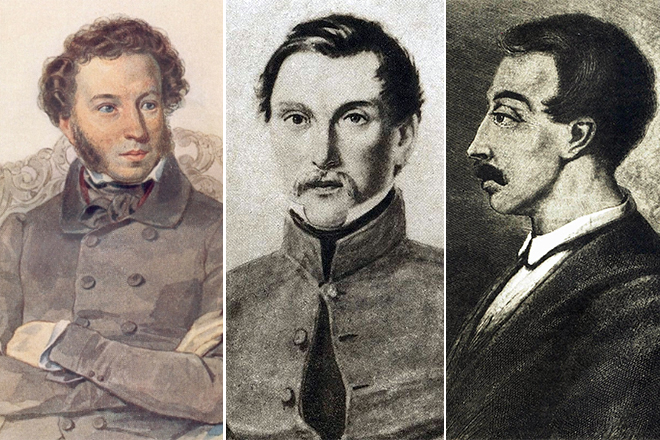
At that time the talent of the young Pushkin was highly appreciated by his friends, and soon he was noticed by such outstanding figures as Batyushkov, Zhukovsky, Derzhavin, and Karamzin. In 1815, Alexander, passing the exam, read the poem "Remembrance in Tsarskoe Selo" in the presence of Derzhavin. The poet was really impressed.
Career of Alexander Pushkin
In 1817, Alexander Pushkin joined the College of Foreign Affairs. The poet's family moved to the capital. Pushkin lived in Kolomna, at Fontanka Street, at the seven-room-apartment on the third floor. Pushkin lived there from 1817 to 1820 years. It is considered, that there the poet wrote his works such as “Ode to Liberty" and "Ruslan and Ludmila."
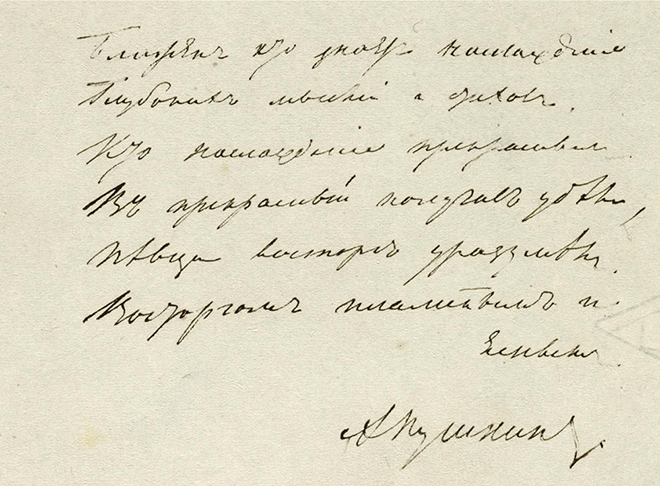
The College of Foreign Affairs was located at Angliyskaya Naberezhnaya, in the building of the current Foreign Ministry. Co-workers of the young diplomat were his friends from lyceum Küchelbecker, Korsakov, and Gorchakov. The poet didn’t show interest in this job but worked there from 1817 to 1824 years. Later, Alexander Sergeyevich used the received knowledge in "Notes on the Russian history of the XIII century" written in 1822.
The life in the capital seemed attractive and interesting to the freedom-loving poet after the Lyceum. The students, who graduated from this Lyceum, called it a monastery because there were strict rules and the students were isolated from the outside world.
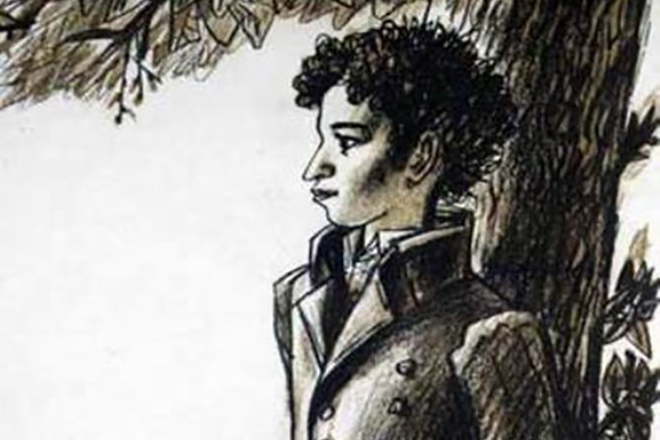
The poet was friends with hussars and poets, with artists and musicians. He fell in love, fought in duels, visited theaters, fashionable restaurants, salons, literary circles. Women played an important role in his life and work, especially during his youth. Pushkin admired his muses, dedicating poems to them. Mostly, the feelings of the young Alexander Sergeyevich were platonic.
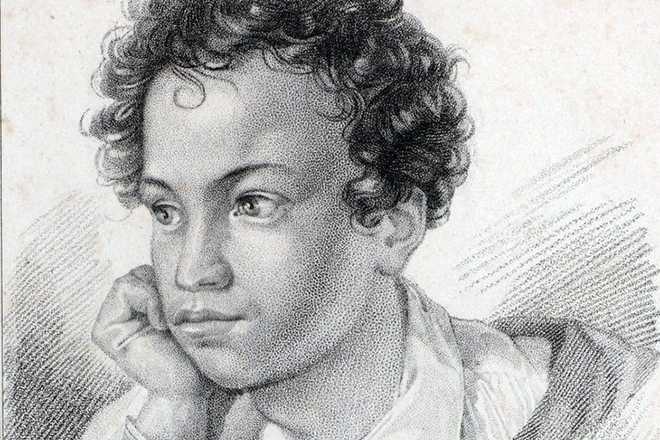
At this time, he offered to marry the youngest daughter of Olenin, Anna. Pushkin often visited their mansion at the Fontanka Street. Anna Olenina refused to marry Pushkin and the poet soon met a new muse, the niece of the mistress of the house, Anna Kern. He dedicated the poem "I remember a wonderful moment" to her.
The first "southern" exile
The society was excited and proud of their people because of the victory over Napoleon. At the same time, there were dangerous ideas in the minds of famous people, not just innovative but revolutionary. This freedom-loving spirit had a great impact on Pushkin, who visited one of the radical literary circles "Green Lamp". As a result, such well-known poems as "Liberty", "Village", "At Arakcheeva” appeared but were not published.
The young poet fell into disgrace with the emperor and was exiled to Siberia. With the help of poet’s friends, he went to the south. On May 6, 1820, the poet went to a new place of service under the leadership of Lieutenant-General I.N. Inzov.
From 1820 to 1824, Pushkin visited different cities of the Russian Empire:
• Ekaterinoslav;
• Taman;
• Kerch;
• Feodosia;
• Gurzuf;
• Bakhchysarai;
• Simferopol;
• Chisinau;
• Kamenka;
• Akkerman;
• Bender;
• Izmail;
• Kiev;
• Odessa.
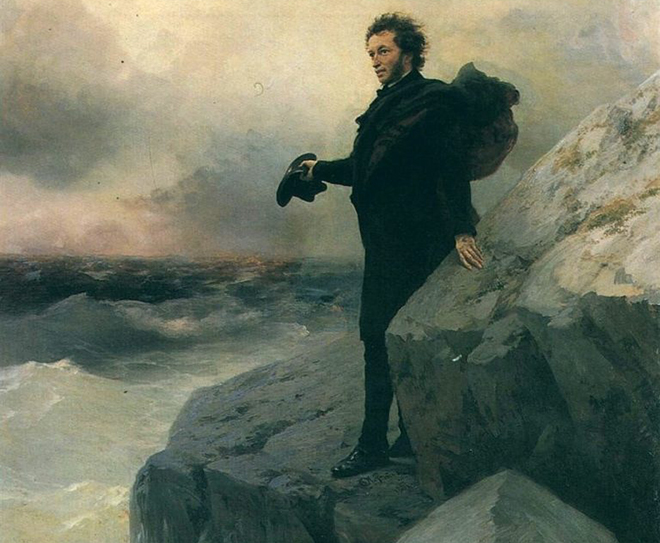
The result of the exile was great impression and emotions that inspired the poet to create some poems. In the period of the southern exile, Pushkin wrote such poems as "The Prisoner of the Caucasus", "The Fountain of Bakhchisaray", "The Gypsies", "Gavriiliada ". In Crimea, Alexander Sergeyevich for the first time came up with the idea of writing "Eugene Onegin". He began working in Chisinau.
In Kamenka, the poet managed to meet the members of the secret society, and in Chisinau, he was even accepted into a Masonic lodge.
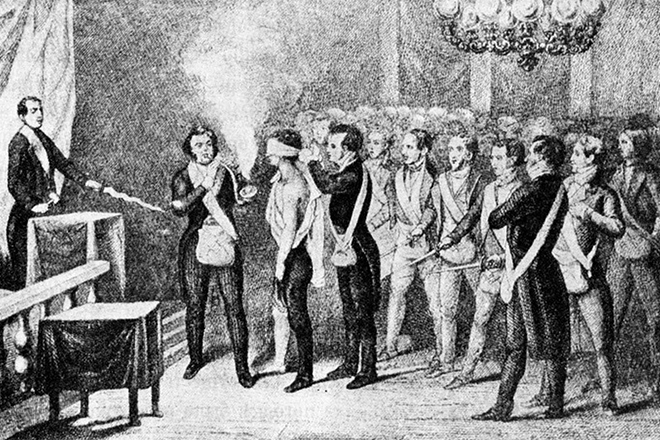
In Odessa, with its operas, restaurants, and theaters, Pushkin arrived already a famous romantic poet, who was called "the singer of the Caucasus". However, in Odessa, Alexander Sergeyevich had not very good relations with the Count M. S. Vorontsov.
There were rumors about the poet's relations with the Count's wife. The man soon found a way to get Pushkin out of town. The Moscow police found Pushkin's letter, where he admitted his interest in atheism. It was immediately reported to the emperor. In 1824, Alexander Sergeyevich was dismissed and went to his mother's estate, to Mikhaylovskoye village.
Mikhaylovskoye
When the poet returned at home, he again was exiled. His own father oversaw his son, and such a life for the freedom-loving Alexander Sergeyevich was unbearable. As a result of a serious conflict with his father, the whole family, including his mother, brother and sister, left Mikhaylovskoye and moved to the capital. Pushkin was left alone in the company of Arina Rodionovna.
Despite the depression, for two years, spent in Mikhaylovskoye, the poet worked a lot. Pushkin didn’t understand the usual "landlord" fun. He read a lot, filling in the gaps in the home and lyceum education. The poet constantly ordered books from the capital, which were inspected by the police; his letters were also opened and read.
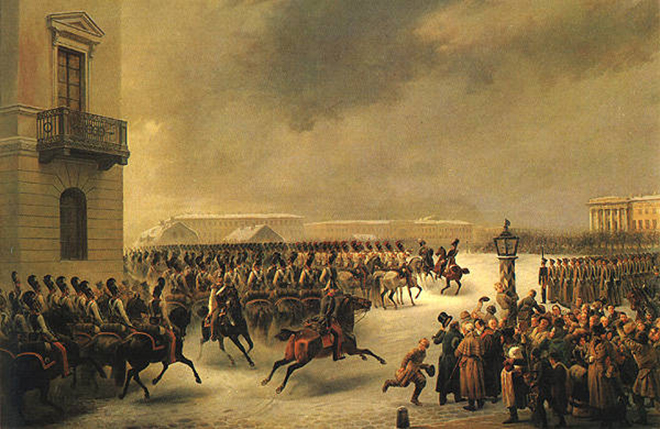
At this time, "The Prisoner of the Caucasus", "Boris Godunov", "Graf Nulin", a lot of poems (including "Winter morning", "Napoleon", "Song of Oleg the Wise"), several articles, several chapters of "Eugene Onegin " were created.
It is known that at the time of the exile to Mikhaylovskoye, Pushchin visited Pushkin. The poet also communicated with the Osipovs family - the landlords, who owned the neighboring village Trigorskoye.
Alexander Sergeyevich learned about the rebellion on December 14, 1825. Many of his friends participated in the organization of the rebellion. Pushkin wanted to take part in the rebellion and that is why his friends told him the wrong date of the upcoming coup and saved the great poet for the country. Many of the participants were exiled to Siberia, and some were hanged.
Adulthood
Emperor Nicholas I, pardoned the poet, returning him from the exile, and allowed to live wherever he wanted. Nicholas decided to publicly "forgive" Pushkin. He hoped to calm the society after the arrests and execution of the most progressive part of the noble youth after the events of December 14. The tsar himself became the official censor of all manuscripts of Alexander Sergeyevich. And Benckendorff, the head of the third department of the Chancellery, controlled this process.
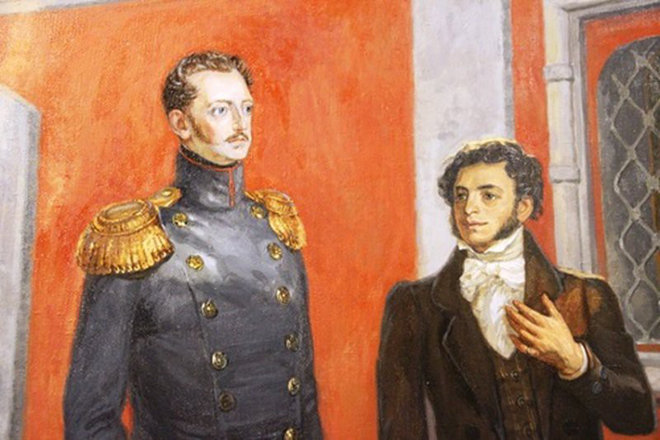
From 1826 till 1828 Pushkin asked the emperor for permission to go abroad or to the Caucasus, but his requests remained unanswered. As a result, the poet voluntarily went on a trip, for which he received a severe reprimand upon his return. The results of the trip were such poems as "The Caucasus", "On the hills of Georgia..." and "Journey to Arzrum."
At the same time, Alexander Sergeyevich met Natalia Goncharova and fell in love with her. All his women were nothing compared to the young beauty, which became the poet's most desired dream. From that moment, Pushkin's personal life focused on the only lady - Natalie, as he called the bride.
Marriage and family
But the young couple faced some difficulties. Pushkin's parents and the parents of his future wife were on the verge of bankruptcy. Goncharov could not give a dowry for his beautiful daughter, and this considered a mauve ton in the society. The poet's father gave a village of two hundred souls, which was near his family estate in Boldino.
Pushkin had to go to Boldino to take possession of Kistenevka. The poet planned to use it in order to collect a dowry for his bride. On September 3, 1930, Alexander Sergeyevich arrived in Boldino (before that he lived in St. Petersburg, then in Moscow). Pushkin intended to quickly finish his work, to return to Moscow to Natalie and to get married. He already got the permission.
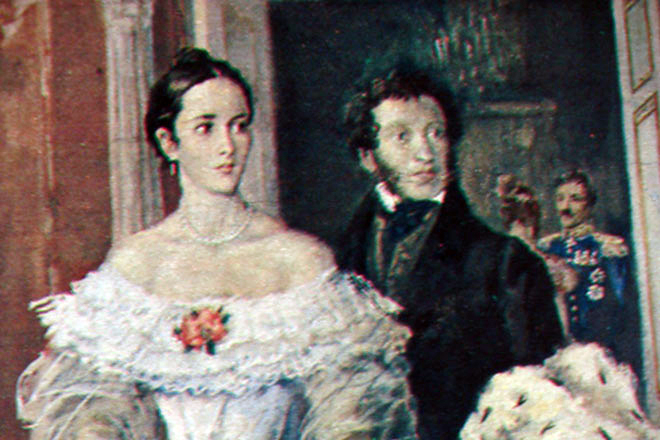
Due to an outbreak of cholera and other circumstances, the wedding was delayed for some time. Because of this terrible illness, the roads from Boldino to Moscow, as well as everywhere in the central part of Russia, were blocked. Pushkin wrote a lot of wonderful poems and novels during this period. Among them were "The Squire's Daughter," "The Shot," "The Bizzard," "The Miserly Knight," "A Feast in Time of Plague," "The Story of the Village of Goryukhino," and other masterpieces.
Pushkin admitted that he always loved autumn and winter. During the cold season, he usually felt an unusual burst of energy and a desire to write. The historians called the period from September to December of 1830 as “Boldino autumn”. Alexander Sergeyevich created his poems far from the hustle and bustle of big cities.
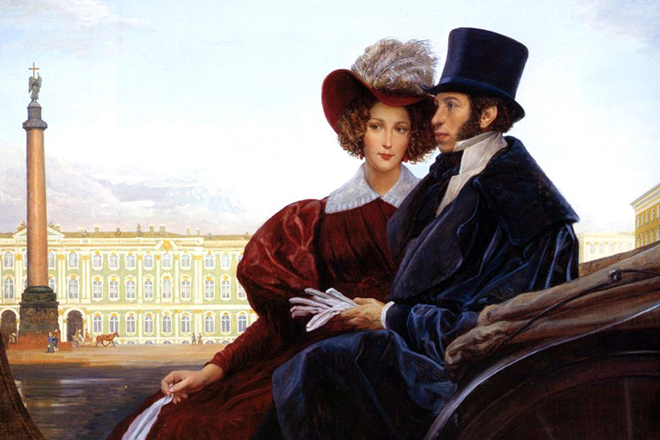
Pushkin returned to Moscow only on December 5, and on February 18, 1831, he finally married Natalia Goncharova. When the couple wanted to exchange their rings, the ring of the poet slipped from his hand, and the candle went out. Pushkin took it as a bad sign but was happy.
Firstly, the newlyweds lived in Moscow, in a house at the Arbat Street, but then the poet quarreled with his mother-in-law, and they left the house. For some time, they rented a wooden house in Tsarskoye Selo, so dear to the heart of the poet. In addition, Nicholas I expressed the desire to invite Pushkin's wife to court balls, which were held in the Catherine Palace.
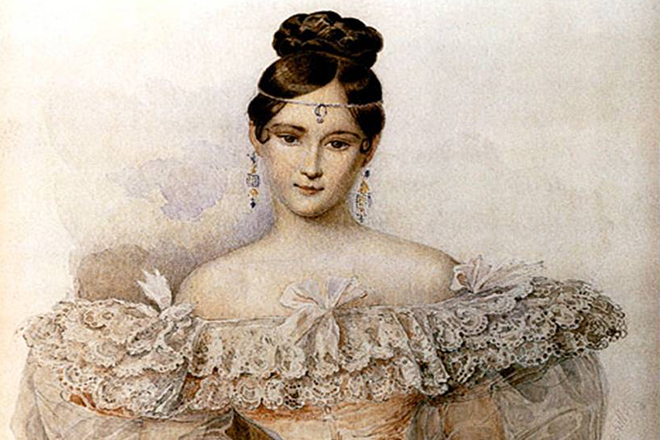
Natalya Nikolayevna responded to her husband’s passion with calm and quiet love. She was intelligent and aristocratic. She became a housewife and brought up their children. Since 1832 till 1836 Natalia gave birth to their two daughters and two sons: Maria, Alexander, Grigory, Natalia.
The father of such a large family had to work a lot in order to feed his wife, children, two sisters of his wife, to organize parties and to attend salons and balls. After moving to Petersburg, in the summer of 1831 Alexander Sergeyevich again joined the service. At the same time, he continued to work hard, because the publication of poems and novels also brought little money. During this period the poem "Eugene Onegin" was completed, "Boris Godunov" was written, "Dubrovsky" and " A History of Pugachev" were conceived.
Duel and death
In 1933, the emperor granted Alexander Pushkin the title of Kammer junker. The poet was deeply offended, since this title was given only to young inexperienced men, and he was already thirty-five. At the same time, this title gave access to the court, and Nicholas wished that Natalia Pushkina attended the imperial balls. As for Natalia herself, who was only twenty-two years old, she was fond of dancing, shining and catching admiring looks.
While the emperor platonically loved Natalia Nikolayevna, Alexander Sergeyevich tried to earn money. He took loans from the Emperor, published the "A History of Pugachev," then worked at the "Contemporary" magazine, where the works of Gogol, Vyazemsky, Turgenev, Zhukovsky, and Pushkin were published. However, all his projects were unprofitable, and the debt was growing.
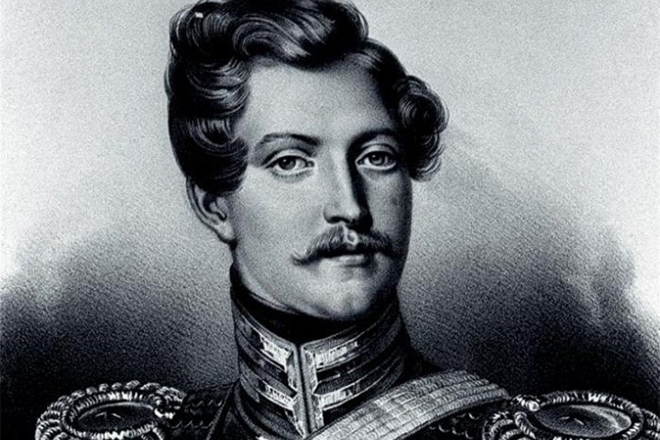
1836 was unhappy for Alexander Sergeyevich. He worked hard, trying to pay his debts. In spring his mother died, and the poet was devastated. Then there were gossips associated with the name of Natalia Nikolayevna and the French Baron d'Anthes, who showed his feelings to Pushkin’s wife.
The first duel, due to the efforts of the poet's friends, did not take place. But Alexander Sergeyevich was ready to defend the honor of his Natalie with arms in his hands. He believed his wife.
Soon, the rumors began to appear in the capital again, and Heeckeren intrigued against Pushkin and his wife, trying to disgrace both of them. The poet sent an insulting letter to the ambassador. Heeckeren did not have the opportunity to personally fight a duel, as this meant the collapse of his diplomatic career. So D’Antes, defending his foster father, fight a duel with Alexander Sergeyevich.
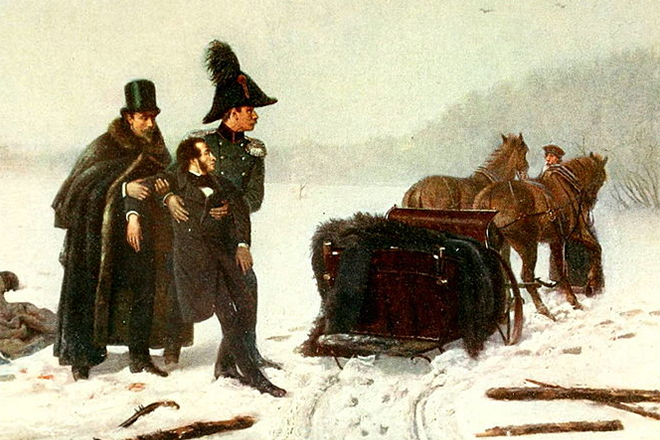
Fateful meeting of opponents took place on January 27, 1837, at the Black River. Pushkin was wounded in a hip and the bullet penetrated into the abdomen. This was the cause of the poet's death because at that time such injury was incurable. Two days later Alexander died in terrible agony.
Without losing courage and his mind, Pushkin wrote to the emperor, who promised to take care of his family, confessed to the priest, said goodbye to his relatives and died on January 29 (February 10 - according to the new style) 1837.
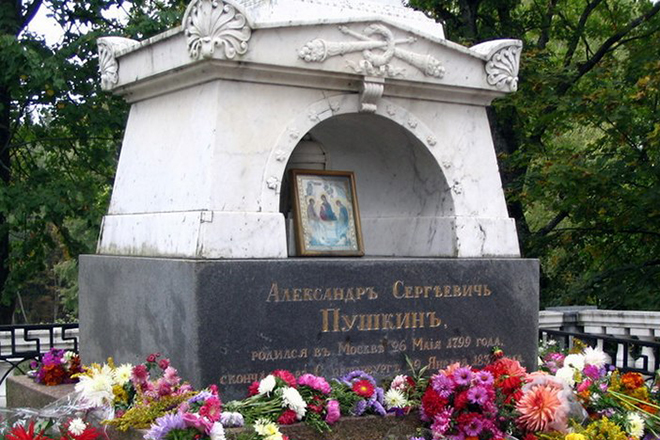
After Pushkin's death, grateful descendants erected many monuments in his honor. Only in Petersburg and Moscow, there are about forty of them.
Interesting Facts
After the death of the poet, many legends appeared, connected with his life, creativity and even with death. So, one of our contemporaries from Canada, put forward a version, according to which Pushkin and Alexandre Dumas are the same person. But this legend does not withstand any criticism.
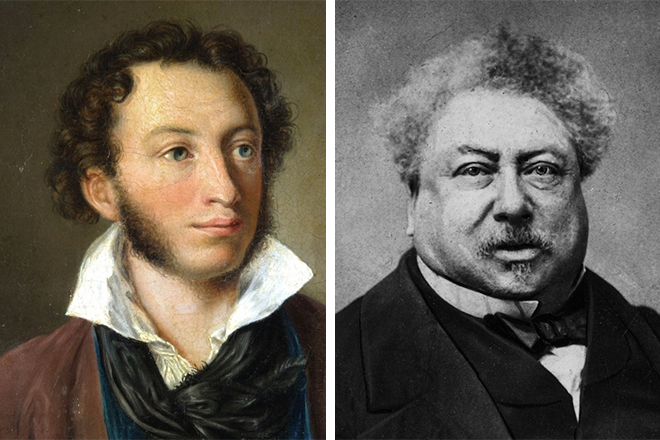
The information that Pushkin and Lev Tolstoy are distant relatives is absolutely true. The great-grandmother of Alexander Sergeyevich and the great-great-grandmother of Lev Nikolayevich were sisters.
Alexander Sergeyevich has poems with profanity (publishers replaced these words with spaces and dots), as well as rather vulgar comic poems.
Bibliography
Poems:
• "Ruslan and Ludmila";
• "Prisoner of the Caucasus";
• "The Gabrieliad";
• "Vadim";
• "The Robber Brothers";
• "The Fountain of Bakhchisaray";
• "Gypsies";
• "Count Nulin";
• "Poltava";
• "Tazit";
• "The Little House in Kolomna";
• "Yezersky";
• “Angelo”;
• "Bronze Horseman”.
Novels
• "Eugene Onegin"
Dramas
• "Boris Godunov"
Small tragedies:
• "The Covetous Knight";
• "Mozart and Salieri";
• "The Stone Guest";
• "Feast in Time of Plague";
• “The Mermaid”.
Prose:
• "The Moor of Peter the Great";
• "The Shot";
• "The Blizzard";
• The Undertaker;
• "Stationmaster";
• "The Squire's Daughter”;
• "The Story of the Village of Goryukhino";
• “Roslavlev”;
• “Dubrovsky”;
• "The Queen of Spades";
• "History of Pugachev";
• "Egyptian Nights";
• "Journey to Arzrum";
• "The Captain's daughter".
Fairy tales:
• "The Bridegroom";
• "The Tale of the Priest and of his Workman Balda";
• "The Tale of the Female Bear";
• "The Tale of Tsar Saltan";
• "The Tale of the Fisherman and the Fish";
• "The Tale of the Dead Princess and the Seven Knights";
• "The Tale of the Golden Cockerel."





